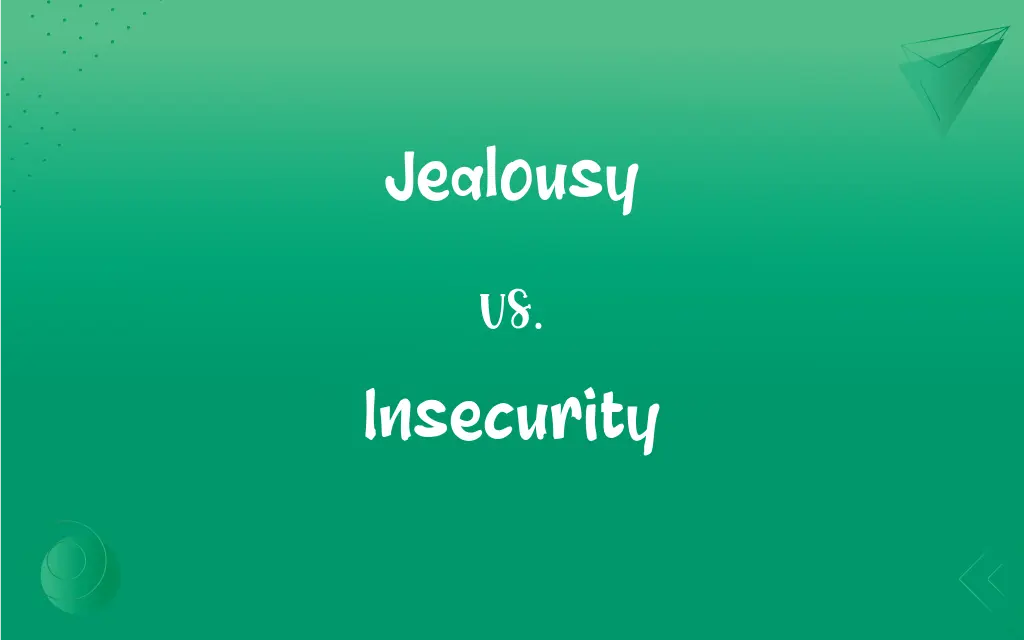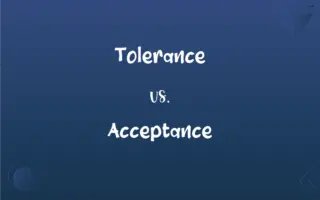Jealousy vs. Insecurity: What's the Difference?
Edited by Harlon Moss || By Janet White || Published on January 22, 2024
Jealousy is a response to a perceived threat to a valued relationship or possession, while insecurity is a feeling of uncertainty or anxiety about oneself.

Key Differences
Jealousy often arises when an individual perceives a threat to a valued relationship, fearing its loss to a rival. In contrast, insecurity stems from a person's doubts about their own worth, abilities, or stability in various aspects of life.
Jealousy is typically directed towards external situations or people seen as threats, while insecurity is more about internal self-doubt and lack of confidence. Jealousy can manifest as possessiveness or competitiveness, whereas insecurity often leads to feelings of inadequacy or unworthiness.
Jealousy frequently involves three parties – the individual, the object of jealousy (such as a partner), and a perceived rival. Insecurity, however, is a personal experience, not necessarily involving comparisons with others, but rather a subjective sense of instability or insufficiency.
In relationships, jealousy may cause someone to act out or monitor their partner, driven by the fear of losing them. Insecurity in relationships, however, might lead to a need for constant reassurance, stemming from doubts about one's own desirability or worth.
Jealousy can sometimes be a temporary reaction to specific situations, like seeing a partner with someone else. Insecurity, on the other hand, tends to be a more pervasive feeling, affecting various areas of life and not necessarily tied to specific external events.
ADVERTISEMENT
Comparison Chart
Basic Definition
Reaction to threats to a relationship or possession
Feeling of self-doubt and lack of confidence
Focus
Directed towards external threats or rivals
Centered on internal feelings and self-perception
Involvement of Others
Often involves a third party or rival
Primarily a personal experience
Common Manifestations
Possessiveness, envy, resentment
Anxiety, self-doubt, need for reassurance
Relationship Dynamics
Fear of losing someone or something to another
Feelings of unworthiness or inadequacy in oneself
ADVERTISEMENT
Jealousy and Insecurity Definitions
Jealousy
Jealousy is an emotional response to a perceived threat to a valued relationship.
He felt a pang of jealousy when he saw his girlfriend talking to her male coworker.
Insecurity
Insecurity can stem from fears of inadequacy or not measuring up.
She felt insecurity about her appearance when comparing herself to models.
Jealousy
It involves feelings of envy and resentment towards a rival or situation.
Her jealousy was evident when her sister received more attention at the party.
Insecurity
Insecurity is a feeling of uncertainty or anxiety about oneself.
Her insecurity about her skills made her hesitant to apply for the job.
Jealousy
Jealousy can manifest as possessiveness or fear of loss in relationships.
His jealousy led him to check his partner's phone messages frequently.
Insecurity
Insecurity can lead to overcompensation or defensive behavior.
Her loud and assertive demeanor masked her underlying insecurity.
Jealousy
Jealousy can disrupt relationships and lead to conflict.
Their friendship suffered due to his jealousy over her new friends.
Insecurity
It often involves self-doubt and lack of self-confidence.
His insecurity was apparent in his reluctance to voice his opinions.
Jealousy
It often arises from comparisons with others perceived as threats.
She experienced jealousy upon seeing her colleague's professional success.
Insecurity
It affects how one perceives and values themselves.
His constant need for validation was a sign of deep-seated insecurity.
Jealousy
A jealous attitude or disposition. See Usage Note at jealous.
Insecurity
Not sure or certain; doubtful
Unemployed and facing an insecure future.
Jealousy
Close vigilance.
Insecurity
Inadequately guarded or protected; unsafe
A shortage of military police made the air base insecure.
Jealousy
A state of being jealous; a jealous attitude.
Jealousy
(archaic) A close concern for someone or something, solicitude, vigilance.
Jealousy
The quality of being jealous; earnest concern or solicitude; painful apprehension of rivalship in cases directly affecting one's happiness; painful suspicion of the faithfulness of husband, wife, or lover.
I was jealous for jealousy.
Jealousy is the . . . apprehension of superiority.
Whoever had qualities to alarm our jealousy, had excellence to deserve our fondness.
Jealousy
A feeling of jealous envy (especially of a rival)
Jealousy
Zealous vigilance;
Cherish their official political freedom with fierce jealousy
FAQs
Can jealousy be positive?
Mild jealousy can sometimes motivate positive changes, but it's often harmful.
Do men and women experience jealousy differently?
They may experience it differently due to social conditioning, but it varies individually.
How does insecurity affect relationships?
Insecurity can lead to clinginess, need for reassurance, or self-sabotage in relationships.
Is jealousy always related to romantic relationships?
No, jealousy can also arise in friendships, work relationships, or family dynamics.
How can one manage feelings of insecurity?
Developing self-awareness, self-compassion, and addressing underlying issues can help.
What triggers jealousy?
Perceived threats to valued relationships or possessions often trigger jealousy.
What are common signs of insecurity?
Frequent self-doubt, anxiety, and lack of confidence are signs of insecurity.
Can insecurity be overcome?
Yes, through self-reflection, therapy, and building self-esteem, insecurity can be managed.
What's the difference between jealousy and envy?
Jealousy involves a third party and fear of loss, while envy is a desire for what others have.
Is jealousy a sign of love?
Not necessarily; it's more about fear of loss and control than love itself.
Can jealousy be a symptom of underlying issues?
Yes, it can stem from personal insecurities, trust issues, or past traumas.
Are there different types of insecurity?
Yes, including emotional, social, financial, and physical insecurities.
Is it possible to completely eliminate jealousy?
It's challenging to eliminate, but managing reactions and understanding its roots helps.
Can therapy help with jealousy issues?
Yes, therapy can be effective in addressing the root causes of jealousy.
What causes insecurity in a person?
Past experiences, societal pressures, and personal temperament can cause insecurity.
Is insecurity always a negative trait?
While often viewed negatively, it can lead to self-improvement efforts.
How does culture influence perceptions of insecurity?
Cultural norms and values can shape what is considered an insecurity.
What role does self-esteem play in insecurity?
Low self-esteem often contributes to feelings of insecurity.
How do societal standards contribute to jealousy?
Societal pressures and comparisons can amplify feelings of jealousy.
Can insecurity be hidden?
People often mask their insecurities with overcompensation or opposite behaviors.
About Author
Written by
Janet WhiteJanet White has been an esteemed writer and blogger for Difference Wiki. Holding a Master's degree in Science and Medical Journalism from the prestigious Boston University, she has consistently demonstrated her expertise and passion for her field. When she's not immersed in her work, Janet relishes her time exercising, delving into a good book, and cherishing moments with friends and family.
Edited by
Harlon MossHarlon is a seasoned quality moderator and accomplished content writer for Difference Wiki. An alumnus of the prestigious University of California, he earned his degree in Computer Science. Leveraging his academic background, Harlon brings a meticulous and informed perspective to his work, ensuring content accuracy and excellence.






































































